8 The School of Science and Mysteries
Created by Thiago Bomfim and Thales Dourado
| Level | Materials |
| B1 (children) | Dice
Blank flipchart paper Crayons Cards (at the end of this chapter) Handouts (at the end of this chapter) Picture of the secret garden (at the end of this chapter) Floor plan of the big house (at the end of this chapter) Note: Check the Introduction to Role-Playing Adventures for instructions on how to use the dice, how to integrate writing into the RPA, and how to adapt the RPA to different size classes. |
Storyline: Students need to find their way to a secret society to save a man, Angus Smith. At the end, students find out that Angus has actually been testing them to see if they would be good candidates to join the secret society of the School of Science and Mysteries.
| # | Task | Suggested Time |
| 1. | Optional: Ask students to create a second identity (see Introduction to Role-Playing Adventures for instructions). If your students already have a second identity, you may choose to use them for this adventure.
My personal Experience: In one of my groups, a student joined the class after students had already created their second identities. I told the class to create a fantastic identity for him. As the class made suggestions, the new student sat in the middle of the class. The new student was told he had the right to refuse any suggestions and could ask the group to provide alternatives. For example, students suggested he was a doctor but the new student didn’t want to be a doctor. The class then started giving him other options until he settled with a Formula 1 racer. This activity helped integrate the new student into the group. Once students have created their second identities, tell them they are going on a trip. As a group, they will decide where they are going to. Encourage them to choose an unusual country, so that they have an opportunity to learn about countries that are off the beaten path. |
10 – 50 minutes depending on the level of the students, size of the class, and previous knowledge of the vocabulary. |
| 2. | Ask the class what they know about the chosen country. As homework (or in the classroom if students have access to the Internet), assign the different tasks below to different students/groups. Students will need to look up the information and present their findings to the class. If possible, encourage students to include pictures related to their tasks. Make a big poster with the pictures and affix it to the wall. | 40 – 80 minutes depending on the level of the students, size of the class, and previous knowledge of the vocabulary. |
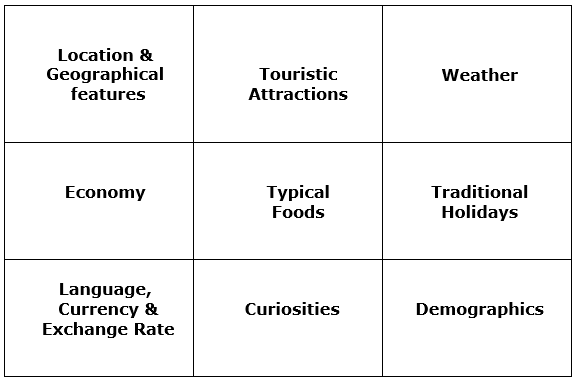
| # | Task | Suggested Time |
| 3. | Place students in small groups and tell them that within their group, they have to establish some relationship. They can be friends, members of the same family, old classmates, and the like. They are also to explain the reason why they are traveling to the chosen country. Allow them about five minutes for discuss and open the groups and get some feedback about their decisions. Don’t forget to show interest and ask follow-up questions. For example: A group says they form a family and are traveling together to celebrate their parents’ wedding anniversary. You could ask: how long have you been married? Wow, that’s a long time! | 30 – 50 minutes depending on the level of the students, size of the class, and previous knowledge of the vocabulary. |
| 4. | Tell the class it is time to pack their bags. Explain that they are taking a suitcase with clothes and personal items and a carry-on.
Give each student a blank sheet of paper and tell them that besides any clothing items, they can only take three other things in their carry-on. They have 2 minutes to write down what they are going to take. At this point, the teacher may censor or use the dice to rule out an item and ask students to replace it with something else. For unusual or unexpected items, students should give a good explanation as to why they need it. The more creative the student is, the greater the chance to succeed when rolling the dice. For example, suppose a student suggests a cell phone, which is an expected item. Roll the die and say, if you get 1, 2, or 3 you get to take the cell phone. Otherwise, you need to replace it with something else. This encourages students to think out of the box and explore their vocabulary. In addition, students will not have the same objects in their carry-ons. Note: You can also determine that some objects be immediately banned (drug- or gun-related items, for example). Prepare a list including all the items the students are taking. It is important that this list be available for future use during the adventure. |
15 – 50 minutes depending on the level of the students, size of the class, and previous knowledge of the vocabulary. |
| 5. | Optional Task
After the decision-making process, tell students they are on a plane. You may wish to review vocabulary related to airports (check-in, passport, visa, boarding pass, boarding the plane) and vocabulary related to on-the-plane situations (fastening the seatbelt, asking the flight attendant for something, asking for an extra blanket, complaining about faulty ear-phones). |
30 – 50 minutes depending on the level of the students, size of the class, and previous knowledge of the vocabulary. |
| 6. | Tell the students they are on a plane. Place them in groups of three and say:
You are all seated and on the way to your destination (say the name of their destination). At some point during your flight, however, there is a minor incident. Together with your group, decide what happened and how the problem was solved. You may provide a model such as the one below: For example, there was heavy turbulence and one of your friends threw up all over someone else’s clothes. S/He didn’t have any extra clothing items in his / her bag, so s/he borrowed some from someone else. Give the groups 5 minutes to come up with the incident and the solution. After that, ask them to present the incident to the whole class. |
30 – 40 minutes depending on the level of the students, size of the class, and previous knowledge of the vocabulary. |
| 7. | Say: You have arrived at your destination and you are at the airport. You have gone through immigration and now you are by the baggage carrousel to claim your suitcases. You notice, however, that time is passing by and you are the only ones whose suitcases never come. Your bags have been lost!
Have students role-play the following situation using the cards below. If you wish, use the scenario format(see Introduction to Role-Playing Adventures for instructions). Make sure to give students feedback on their role-play. |
40 – 50 minutes depending on the level of the students, size of the class, and previous knowledge of the vocabulary. |
Card 1 – Passengers
The airline company has lost your baggage. What are they going to do about it? Where are your bags? How long will it take for your bags to arrive? What are you going to do without your clothes? Ask the company for money compensation. What is their policy? You had planned to take the train to the hotel and the tickets were in your bags! You don’t have extra cash to cover the expenses of buying a set of clothing or eating at a restaurant while you wait for the baggage to arrive.
Card 2 – Company agent
The company is not allowed to give cash to customers. Normally, you get an address and send the baggage to the address provided. Can you offer anything else? Maybe accommodation in a hotel for one night, etc. The baggage has been located. It was misplaced but will arrive tomorrow evening.
| # | Task | Suggested Time |
| 8. | Say: Your first day was tough, but you ended up sleeping well. It’s morning now, and you have decided to go for a walk in the city. It’s a beautiful, pleasant day. Suddenly, an old lady approaches you.
Play the role of the old lady using the card below. Since you know what is going to happen in the adventure, you may add some information at your discretion. Before the lady starts talking, tell students they may interrupt her and ask for clarification or more information at any time. After the old lady leaves, ask the class to try to remember (use collective memory) all the information the lady gave. Write the main information on a poster and affix it to the wall. |
30 – 50 minutes depending on the level of the students, size of the class, and previous knowledge of the vocabulary. |
Old Lady
Approach the group and tell them you need help. You have asked many people for help, but nobody believed you!
Your husband went missing many years ago and you never learned what really happened to him. At the time, he was an undergraduate student in the main university of this city. You were both very young and adventurous. You can clearly remember the day he went missing: he left home earlier than usual. He said he would go to the library to do some research, but you know there was something suspicious about that library, something that he had never told you about. After that morning, you never saw him again.
You once heard him talking with a friend and you heard the expression “trap door”. They noticed you and immediately changed the subject. You think this trap door may be important. You have been to that library many times, but you haven’t been able to find any trap door.
You are now in a hurry and cannot stay with them any longer. Say goodbye and leave!
| # | Task | Suggested Time |
| 9. | Say: You have a new mission now: find the old lady’s husband
Tell the class they are in the library of the main local university. Tell them to look for the trap door. Ask them what they can do. If they don’t come up with anything, you may suggest that they walk around, tapping on floors and walls looking for a loose board or a hollow sound. The trap door can be anywhere; The dice will rule where it is. Roll the dice until someone is successful with their suggestion of the secret entrance. After the students find the trap door, tell them they cannot open it because it is locked. There is an alphanumeric keypad beside the door. Whatever number combination students try, they’ll get an ERROR message. After a while, tell students to look around to see if they can find the code. As students suggest a place (e.g., behind that painting), roll the dice to see if the code is there. When they find the code, give them the paper that contains the code. They will need to fold the paper in such a way that they will find the password. Click here to watch how to fold the paper. Note: I usually give my students a code sheet that has already been folded (with creases). This way, they understand that some folding is involved in figuring out the code. Variation: Another possibility is to take some riddles or puzzles for students to solve. They will only unlock the door if they are able to solve them. |
40 – 60 minutes depending on the level of the students, size of the class, and previous knowledge of the vocabulary. |
| 10. | Say: You open the trap door and you see stairs going down. You start going downstairs. It is a cold, narrow and dark pathway. There are some oil lamps hanging on the walls. As you walk, you notice that the pathway gets wider and wider until you reach a clearing. Oh, you have just reached a huge, beautiful garden! There are a couple of small houses and a big one. They are not modern looking. One of the small ones is open, the others are locked. There is also a small lake. The garden is surrounded by a very tall wall that cannot be climbed due to its height and smoothness. You hear a sound. You look back. The door to the stairway is closed. As much as you try, you cannot open it.
Place students into three groups, and assign the following tasks to each group. Remind them to look at the list of things they have to see if they can use anything. Tell the groups to present the outcome of their tasks. |
30 – 40 minutes depending on the level of the students, size of the class, and previous knowledge of the vocabulary. |
Team 1:
You are now in one of the small houses. The house looks old. Draw its blueprint and get ready to describe it. How many rooms are there? Is there any piece of furniture? What? What can you see in each room?
Team 2:
Since the other houses are locked, you have decided to stay in this house. Establish some routine activities for your class. For example: who will wash the dishes, make lunch, make dinner, go looking for food, etc.
Team 3:
Night is coming soon. There is no electricity in the houses. You have to make fire for the night. Think about two different ways to make fire. Get ready to describe in detail how you are going to do it.
| # | Task | Suggested Time |
| 11. | Say: At night, you hear a strange noise, but you can’t tell where it’s coming from and what it is exactly. Are you going to keep watch? Are you going to devise a plan to avoid any possible attacks?
(Note: The noise comes from Angus Smith, who has been watching this group.) With the whole class, elicit their strategies to protect themselves. Write some key words on the board and when students finish giving suggestions, challenge them to recall the strategies suggested using the key words on the board. |
20 – 25 minutes depending on the level of the students, size of the class, and previous knowledge of the vocabulary. |
| 12. | Say: It is morning. When you go to the living room, you find pieces of paper on the dining-room table. It looks like a letter, but it has been cut into small pieces. Can you put it together again?
Place students in groups and give each group a set the pieces of paper (cut each letter into pieces following along the lines before giving it to students – find the photocopiable letter puzzle at the end of this chapter).
|
30 – 50 minutes depending on the level of the students, size of the class, and previous knowledge of the vocabulary. |
This is the letter
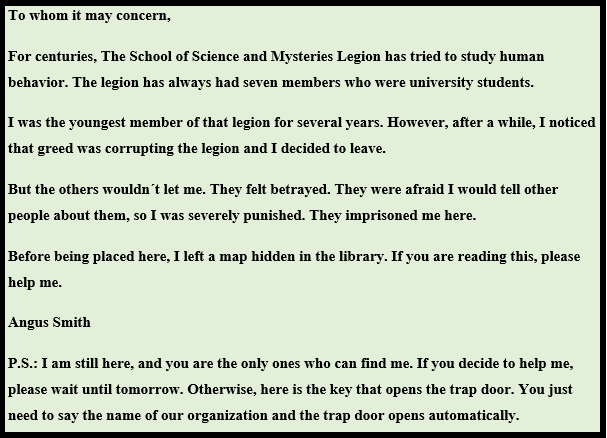
| # | Task | Suggested Time |
| 13. | Ask students whether they will stay for another night. Remind them that their luggage is waiting for them at the airport. If they say they don’t want to face the risk, have them leave and go to the airport to get their luggage. Tell them that if they decide to leave, they will have failed the mission.
Most of the time, students will want to continue. Tell them that if they ask you nicely, you will let them resume the story. Say: The next day, you run to the dining room table and find another piece of paper. On the paper it is written: look for the coded message. Get the coded message and hide it somewhere in your school, and ask students to look for it. You can play ‘hot & cold’ using the whole school area or the blueprint they made of the house. When students find the coded message, give them the coded message card and the list of riddles below. Place students in groups and make a competition to see which group figures out the sentence first. As they find the solutions, a member of the group runs to the teacher and whispers the answer. If it is right, the student then chooses one of the symbols and asks for its letter equivalent. If you have many groups, you may prepare small cards with the symbol on one side and the equivalent on the other (one set for each group). Students won’t need to solve all the riddles because they will probably figure out what some of the letters are on their own. You may choose to change the riddles according to your students’ level. The riddles below are well-known. You have probably heard most of them! |
50 – 80 minutes depending on the level of the students, size of the class, and previous knowledge of the vocabulary. |
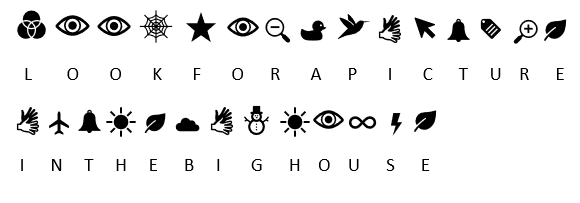
Riddles – Answers:
- An egg
- Nine
- All the couples
- A cold
- Your age
- Five (each of the daughters has the same brother
- The future
- A map
- The letter “M”
- One was bald
- Mary, of course
- None of them. A coconut tree does not grow bananas
- Neither. They both weigh 1 pound
- He fell off the second step
- There are no stairs. It’s a one-story house
| # | Task | Suggested Time |
| 14. | Show the floor plan of the big house to the students and tell them that what they are looking for is hidden somewhere in the house.
They can ask questions (for example: Is it in the bedroom? Is it behind the closet? Under the bed? etc.) but you can only answer ‘yes’ or ‘no’. Continue the game until they find the garden picture and the following message attached to it. You decide where it is hidden. Message attached to the picture of the garden: ‘My tomb is out of sight, but I can hear your steps. Can you find me?’ |
10 – 15 minutes depending on the level of the students, size of the class, and previous knowledge of the vocabulary. |
| 15. | Tell students they have to find the tomb based on the clue in the previous task. Show the the picture of the garden again and elicit suggestions.
The correct answer is ‘under the moss-covered rock located by a small tree on the left-hand side of the second pair of granite slabs forming the path’. Any other suggestions provided are incorrect. When the class locates the tomb, tell them that they found a small wooden box buried under the moss-covered rock. They open the box and see a key inside. Tell students they need to figure out what the key opens. Ask for suggestions. The correct answer is that the key opens one of the locked houses. Any other suggestions are incorrect. |
10 – 15 minutes depending on the level of the students, size of the class, and previous knowledge of the vocabulary. |
| 16. | Say: You enter the house and you see a man standing in the living room. He looks very old.
Ask the class to describe the man. Place students in groups and tell them that they are going to talk with the man. Ask them to prepare as many questions as they can. Tell them they have 10 minutes to work on the questions. When they are ready, open the group and you (teacher) play the role of Angus Smith. The information you need is in the card below. If students ask any questions not covered by the card, improvise. The underlined parts contain important information. If students don’t ask about them, prompt students by saying something like “Aren’t you going to ask why?” or “Aren’t you going to ask any questions about his wife?”. After the conversation with Angus, ask individual students whether they would like to stay or leave and why. Note: You may wish to celebrate the end of the story with blue or red candy or ice cream (or any treat) and students who decide to stay get a red treat and those whose decide to leave get a blue treat. Say: Mission accomplished! |
50 – 80 minutes depending on the level of the students, size of the class, and previous knowledge of the vocabulary. |
You are Angus Smith. Read the information below and be ready to answer the group’s questions. If they ask you anything that is not in this card, use your imagination to fill in the gaps.
You are a member of the School of Science and Mysteries Legion. Many years ago, you were in charge of the architecture of the City University. You were invited to join the School of Science and Mysteries Legion. You really believe in the legion’s ideas. It was a wonderful time. You learned how to understand and control human behaviour. You also studied alchemy, astronomy, and how to talk to animals.
You are now 89 years old, and all the other members of the Legion have already passed away. You are the last one alive. You have been looking for new members, but the current students at the City University do not seem to meet the requirements. You desperately need to pass on all you have learned, and you have been testing groups of tourists who come to the area to no avail. Your wife has been helping you attract potential candidates. This is the first group to be successful through all the tasks.
You have been watching them all this time. They have just taken part of an experiment and they have succeeded. Everything that happened has been carefully planned by you.
The group can go out to the city and lead a normal life, or become part of the legion. You promise them that being a member of the Legion will be an amazing experience! If they prefer to leave, you will have to erase their memories of this adventure. If they choose to stay, they will become wise men and women and will learn all the mysteries of the universe. They will never be hungry, or thirsty, or sick again.
Only one person from the group will be chosen to take over your position as leader of the Legion. The others will become apprentices. If anyone decides to leave, tell them they will have to drink from a concoction that will erase their memories of this adventure. If anyone decides to stay, they will also need to drink another concoction that will make them lose their voice and freeze for 5 minutes if they ever feel like talking or writing about the Legion to any outsiders.
Will they join you?
Cards, Pictures, and illustrations (Photocopiable)
Cards
| Card 1 – Passengers
The airline company has lost your baggage. What are they going to do about it? Where are your bags? How long will it take for your bags to arrive? What are you going to do without your clothes? Ask the company for money compensation. What is their policy? You had planned to take the train to the hotel and the tickets were in your bags! You don’t have extra cash to cover the expenses of buying a set of clothing or eating at a restaurant while you wait for the baggage to arrive.
|
| Card 2 – Company agent
The company is not allowed to give cash to customers. Normally, you get an address and send the baggage to the address provided. Can you offer anything else? Maybe accommodation in a hotel for one night, etc. The baggage has been located. It was misplaced but will arrive tomorrow evening.
|
| Old Lady
Approach the group and tell them you need help. You have asked many people for help, but nobody believed you! Your husband went missing many years ago and you never learned what really happened to him. At the time, he was an undergraduate student in the main university of this city. You were both very young and adventurous. You can clearly remember the day he went missing: he left home earlier than usual. He said he would go to the library to do some research, but you know there was something suspicious about that library, something that he had never told you about. After that morning, you never saw him again. You once heard him talking with a friend and you heard the expression “trap door”. They noticed you and immediately changed the subject. You think this trap door may be important. You have been to that library many times, but you haven’t been able to find any trap door. You are now in a hurry and cannot stay with them any longer. Say goodbye and leave!
|
| Team 1:
You are now in one of the small houses. The house looks old. Draw its blueprint and get ready to describe it. How many rooms are there? Is there any piece of furniture? What? What can you see in each room?
|
| Team 2:
Since the other houses are locked, you have decided to stay in this house. Establish some routine activities for your class. For example: who will wash the dishes, make lunch, make dinner, go looking for food, etc.
|
| Team 3:
Night is coming soon. There is no electricity in the houses. You have to make fire for the night. Think about two different ways to make fire. Get ready to describe in detail how you are going to do it.
|
| You are Angus Smith. Read the information below and be ready to answer the group’s questions. If they ask you anything that is not in this card, use your imagination to fill in the gaps.
You are a member of the School of Science and Mysteries Legion. Many years ago, you were in charge of the architecture of the City University. You were invited to join the School of Science and Mysteries Legion. You really believe in the legion’s ideas. It was a wonderful time. You learned how to understand and control human behaviour. You also studied alchemy, astronomy, and how to talk to animals. You are now 89 years old, and all the other members of the Legion have already passed away. You are the last one alive. You have been looking for new members, but the current students at the City University do not seem to meet the requirements. You desperately need to pass on all you have learned, and you have been testing groups of tourists who come to the area to no avail. Your wife has been helping you attract potential candidates. This is the first group to be successful through all the tasks. You have been watching them all this time. They have just taken part of an experiment and they have succeeded. Everything that happened has been carefully planned by you. The group can go out to the city and lead a normal life, or become part of the legion. You promise them that being a member of the Legion will be an amazing experience! If they prefer to leave, you will have to erase their memories of this adventure. If they choose to stay, they will become wise men and women and will learn all the mysteries of the universe. They will never be hungry, or thirsty, or sick again. Only one person from the group will be chosen to take over your position as leader of the Legion. The others will become apprentices. If anyone decides to leave, tell them they will have to drink from a concoction that will erase their memories of this adventure. If anyone decides to stay, they will also need to drink another concoction that will make them lose their voice and freeze for 5 minutes if they ever feel like talking or writing about the Legion to any outsiders. Will they join you?
|
Code
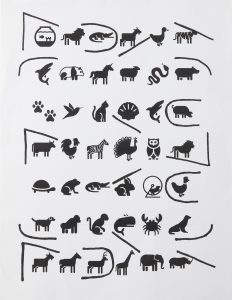
Puzzle letter from Angus Smith
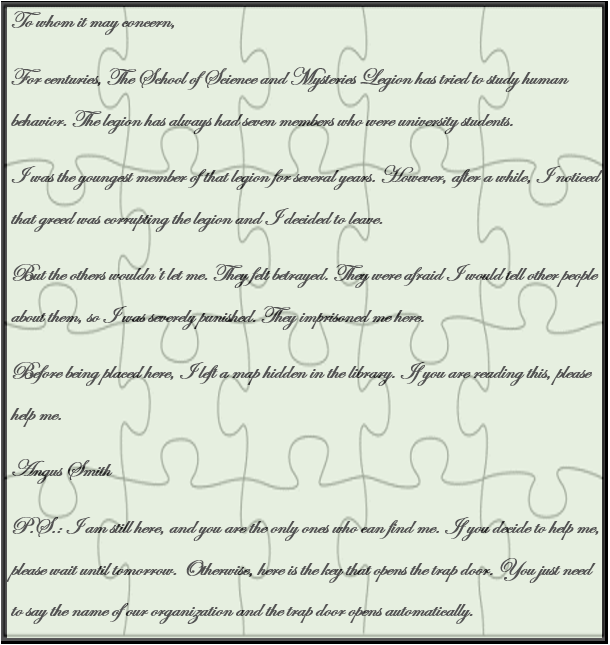
——————————————————————————————————-
Code for students to solve

——————————————————————————————————-
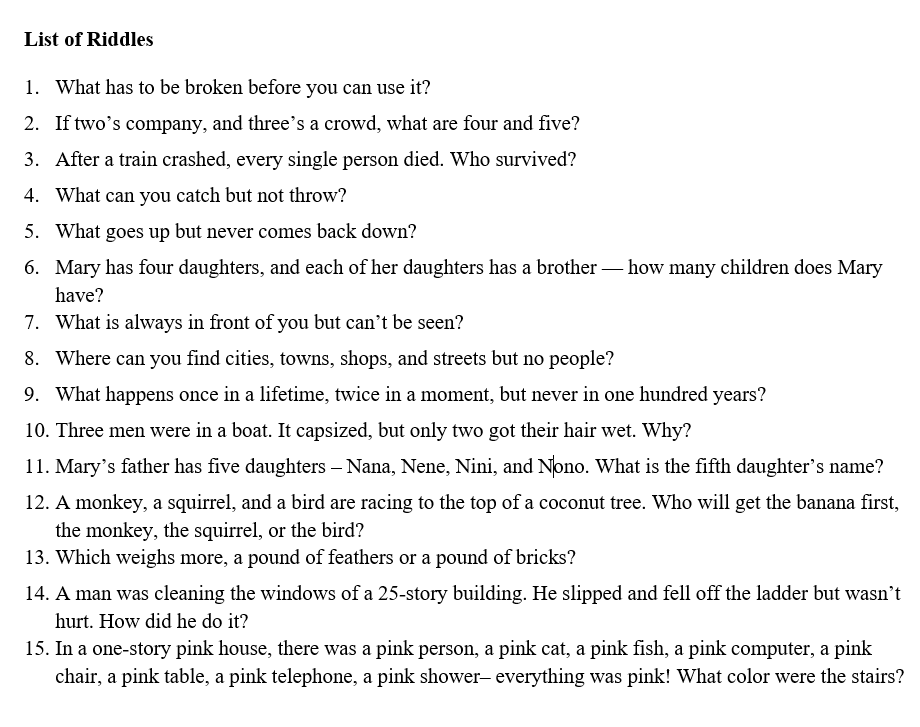
——————————————————————————————————-
Floor Plan of the Big House
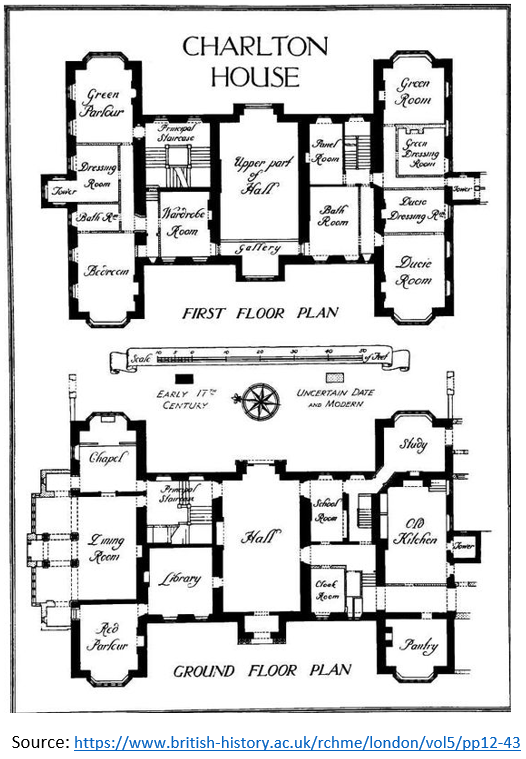
——————————————————————————————————-
The Secret Garden
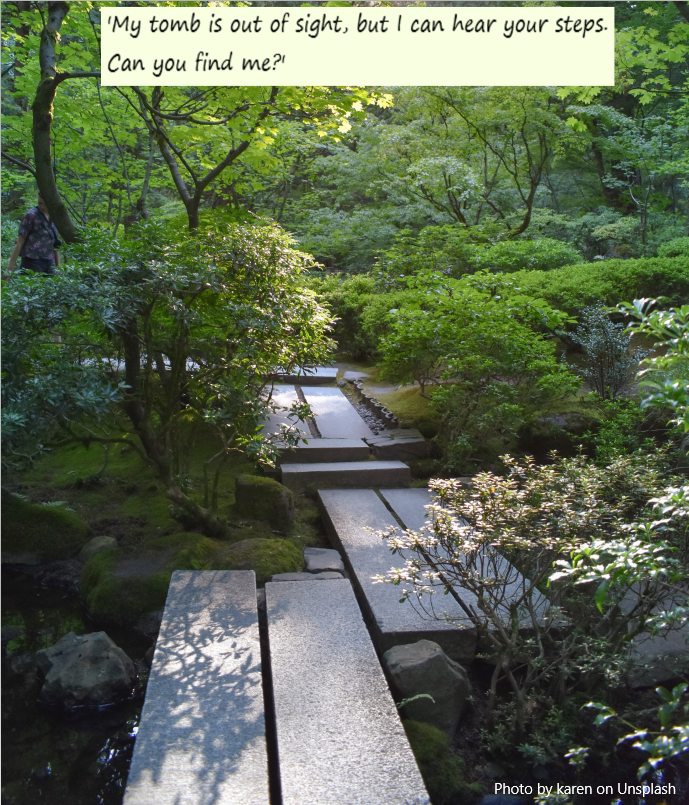


Feedback/Errata